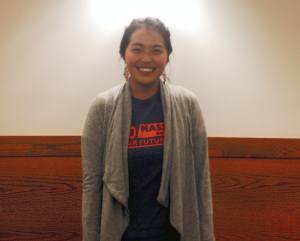When considering progress to address the climate crisis by reducing fossil fuel use, many people may think of the Paris Climate Agreement. However, Alyssa Lee’s career redefines the scale of success in the climate movement. Rather than relying on politicians and diplomats to shape the future of our planet, divestment campaigns at colleges across the United States are empowering young people to take control of the world that they want to live in.

Alyssa Lee wearing a 350 Mass Action T-shirt. 350 Mass Action is the volunteer grassroots group affiliated with the Better Future Project.
In September of 2015, Alyssa left her home in
sunny California to join the Better Future Project in Boston, Massachusetts. The Better Future Project is a non-profit organization that works to promote grassroots movements to address climate change. Working as a campus organizer, Alyssa pioneered the new Climate Justice Fellowship Program for Massachusetts college students. This fellowship provides mentoring, training, and helps establish connections among students seeking to start or strengthen their own divestment campaigns on campus.
Alyssa succinctly states the goal of college divestment campaigns as “putting pressure on school administrators to consider whether it is ethical to profit from fossil fuels.”
Students can take control of what Alyssa describes as their “access to power.” Through these campaigns, students can realize their ability to make a change by putting the spotlight on school administrators. This type of public exposure is all part of a larger mission to stigmatize or brand fossil fuels as undesirable.
Interestingly, Alyssa points out that many colleges don’t have direct investments in fossil fuels, yet school administrators still refuse to take a public stance on the issue. It may seem strange for students to fight so hard for divestment when their schools don’t actually have fossil fuel investments. However, divestment campaigns are symbolically important.
Although money often equates to power, reputation is everything. When colleges refuse to take a stance against the fossil fuel industry, they perpetuate its “social license to operate.” This legitimacy allows fossil fuel companies to continue operating, generating pollution, and contributing to the climate crisis. Divestment challenges this legitimacy by raising opposition to fossil fuels and publically questioning the acceptability of college administrators profiting from this industry.
The fossil fuel divestment movement was born at Swarthmore College in 2011. Since the movement started, there have been notable divestment wins at two-dozen colleges across the country. This past May, University of Massachusetts Amherst became the first major public university to divest its endowment from fossil fuels, with the president proudly stating, “Important societal change often begins on college campuses and it often begins with students.” Despite these successes, many college students face challenges mobilizing movements on their campuses.
This is where Alyssa comes in.
Through the Climate Justice Fellowship, Alyssa provides coaching to college students struggling with their leadership roles on campus and the difficulty inherent in positions of power. “People feel uncomfortable being asked to lead. They hesitate to delegate and ask for people’s time, push people, and make decisions.”
What qualifies Alyssa to guide these students?
Alyssa speaks from personal experience. She was a devoted leader and organizer as a student at UCLA up until she graduated in 2014. During her time, Alyssa co-founded a student-run food cooperative and started the Fossil Free UCLA divestment campaign. Alyssa recalls that, as she became an organizer, “a lot of people I respected told me to step into a role I may be uncomfortable with.” It’s easy to see why Alyssa was asked to step up to the plate — she’s a natural organizer, balancing both charisma and optimism. Alyssa went on to train at the Divestment Student Network her senior year, while continuing her critical role in her own school’s divestment campaign.
In addition to mentorship, the Climate Justice Fellowship fosters a sense of solidarity among students fighting for divestment across Massachusetts. Young leaders come together monthly, where they receive training and form cross-campus relationships. These connections help form a broad network of support as students face the daunting task of confronting school administrators and one of the most powerful industries in the world. Alyssa helped to coordinate a cross-campus effort between Amherst, Lowell, Dartmouth, and Boston, bringing these schools together for the first time. Previous fellows have emphasized the importance of these relationships as a source of inspiration and reassurance. Nina Hazelton, a spring 2016 fellow from UMass Amherst, stated, “every time we get together, we are shifting power.”
In the efforts to provide mentoring, training, and connections among schools, Alyssa admits that time for conversation regarding environmental justice issues such as pollution from fossil fuel production and transportation is limited. The “main problem is that we assume many people already know. We all take it for granted.” However, referring to the pollution associated with fossil fuel production and transport, Alyssa said with full sincerity, “I would love to spend fellowship training talking about this.”
Issues of environmental justice are what sparked Alyssa’s passion towards divestment as a student—leading her to the role that she plays now in supporting many other divestment campaigns across Massachusetts.
After so many campaigns, including the UCLA campaign in which the school did not fully divest from fossil fuels, one might think Alyssa would be worn out. However, when asked how she deals with disappointment, Alyssa acknowledged that many divestment campaigns do hear no. But “each disappointing moment should never be bad, it is just momentum for the next thing. Every moment is an opportunity. The next action will always push forward.”